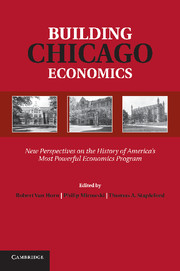 Building Chicago Economics
Building Chicago Economics Theodore W. Schultz, Policy Planning, and Agricultural Economics in the Cold-War United States
from Part Two - Constructing the Institutional Foundations of the Chicago School
Published online by Cambridge University Press: 05 November 2011
In the early winter of 1945, the Committee for Economic Development (CED) met to discuss the wording of their new pamphlet, “Agriculture in an Expanding Economy,” with University of Chicago economist Theodore Schultz. The arguments under discussion were his and would be featured in his forthcoming book, Agriculture in an Unstable Economy, published with the support of the CED by McGraw-Hill. In attendance were other members of the CED Advisory Board: Sumner Slichter, a professor at the Harvard Business School, William Benton, vice president of the University of Chicago, and Beardsley Ruml, former head of the Laura Spelman Rockefeller Fund, policy advisor to FDR, and Treasurer of Macy’s. Schultz attempted to put his associates at ease: They were mindful of how the mandate of their organization – the promotion of free enterprise – would fit into a discussion about heavily subsidized American agriculture.
Several of the members were unclear about Schultz’s vision. According to his rationale, government planning could help those farmers on the cusp of modernizing their operations to do so, as well as help those who lacked the education and resources to take advantage of agricultural modernization to migrate to the cities. When several members questioned how this proposal might be received by the public, given that it could be construed as another move toward socialism, Schultz reduced his grand program to its lowest common denominator: “It is based on classical economics – if earnings are too low then there are too many people and some must get out.” Finally, Schultz boldly stated that it was possible to plan to facilitate a relatively free market, at least given the recalcitrance of the large farm organizations: “There is a great amount of government control and a great amount of individual freedom in the farm picture at the present time. We may need more government to give the farmer greater freedom.”
To save this book to your Kindle, first ensure [email protected] is added to your Approved Personal Document E-mail List under your Personal Document Settings on the Manage Your Content and Devices page of your Amazon account. Then enter the ‘name’ part of your Kindle email address below. Find out more about saving to your Kindle.
Note you can select to save to either the @free.kindle.com or @kindle.com variations. ‘@free.kindle.com’ emails are free but can only be saved to your device when it is connected to wi-fi. ‘@kindle.com’ emails can be delivered even when you are not connected to wi-fi, but note that service fees apply.
Find out more about the Kindle Personal Document Service.
To save content items to your account, please confirm that you agree to abide by our usage policies. If this is the first time you use this feature, you will be asked to authorise Cambridge Core to connect with your account. Find out more about saving content to Dropbox.
To save content items to your account, please confirm that you agree to abide by our usage policies. If this is the first time you use this feature, you will be asked to authorise Cambridge Core to connect with your account. Find out more about saving content to Google Drive.